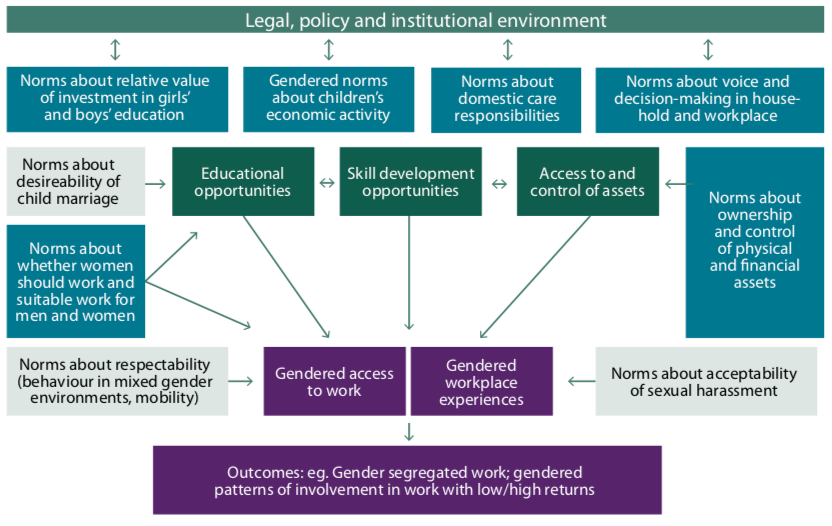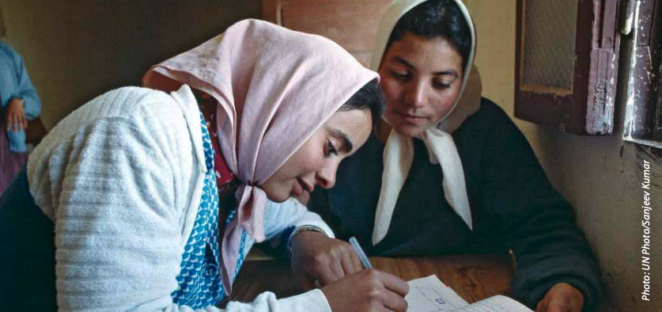The norms factor: recent research on gender, social norms, and women’s economic empowerment

Introduction
Gender discriminatory social norms are a widely recognized barrier to women’s economic empowerment, affecting both their access to “decent work” and their experience in workplaces. Between 2013 and 2018, the International Development Research Centre (IDRC)-funded Growth and Economic Opportunities for Women program (GrOW) supported 14 research projects on issues related to women’s economic empowerment in more than 50 countries.
Although few GrOW studies focused on social and gender norms, they have generated a body of evidence about the ways in which discriminatory gender norms affect women’s access to economic opportunities and their work experiences.
The report findings*help explain stagnation in women’s labour force participation in some contexts, the frequent concentration of women in relatively less lucrative sectors and occupations than men, and gendered barriers and challenges that disproportionately affect women.
Most studies reported here were framed broadly within the discipline of economics. Five of the studies made use of extensive qualitative research along with quantitative analysis; these generated direct insights concerning gender norms, as did studies analyzing demographic and health survey (DHS) data. The other studies making use of large datasets helped illuminate the relationship between gender norms; the political, legal, policy and institutional environment; and women’s economic empowerment.
*Download the report from the right-hand column for full details. Excerpts from the report’s Executive Summary are provided below.
Constraining impacts of social and gender norms on women’s economic activity
The following key findings from the report highlight how social and gender norms constrain women’s economic activity.
Ambivalence about women working outside the home, with some generational shifts
- The studies from South Asia revealed considerable ambivalence about women’s work outside the home, other than in high-skilled, high-status occupations or in work that can be undertaken at or near home.
- Studies of economic change (such as trade liberalization) found an increasing entry of women into paid labour in some contexts, indicating that growing opportunities can lead to shifts in behaviour, and possibly in gender norms.
- The studies from East Africa highlighted generational differences: young women with secondary education are increasingly motivated to work outside the home, even where this contravenes prevailing norms and the views of the older generation.
Norms concerning reputation and decorum
- These norms contributed both to limiting women’s work outside the home and to the concentration of women in less lucrative activities.
- Examples included: prohibitions on women’s involvement in underground mining in East, Central, and West Africa; and in roles requiring mixing with men or undertaking non-traditional work in South Asia.
- Job segregation was reinforced by gossip questioning the moral standing and reputations of women engaged in male-dominated work, or in work involving travel or residence away from home.
Norms assigning the bulk of domestic duties to women
- These norms and related inequalities in workloads and leisure time emerged as the other main constraint to women’s economic activity.
- Qualitative studies from East Africa found some relaxation of individual men’s attitudes and younger men taking on a greater share of domestic work, although norms around ideal divisions of labour had shifted little.
- Critical comments about the quality of working women’s domestic care and about the manliness of men undertaking domestic work contributed to reinforcing norms about gender labour divisions.
Norms around adolescent marriage and child-bearing
- Studies from East and West Africa highlighted the role of education as a route to higher quality work and the constraining effects of early marriage, childbearing, and child labour.
- The in-depth Uganda study showed how gender norms, both in wider society and among girls’ peer groups, contribute to early marriage and childbearing and thus limit educational achievement and women’s future economic opportunities. This is particularly so in rural areas.
Widespread work-related sexual violence constrains women’s economic activity
- Fear of sexual violence also deters women from entering the labour force and contributes to gendered job segregation.
- Three studies highlighted the pervasiveness of such violence, although they did not examine the nature of norms that enable sexual violence to persist.
- Another three studies probed the relationship between women’s paid work and intimate partner violence.
- They found that, although there is a relationship in some regions (Latin America and East Africa), it varies by sector; women working in agriculture are most likely to experience greater intimate partner violence.
- Overall, these studies suggest that the common view that women’s labour force participation leads to resistance, expressed through intimate partner violence, needs some qualification.

What factors lead to changes in gender norms?
The report hightlights the following factors as being influential in changing social and gender norms.
Large-scale economic change
- Economic change appears to contribute to changing gender norms in some contexts by increasing the availability of work perceived as suitable for women.
- Although few macro-focused studies examine norm change directly, there is some evidence that greater economic opportunities increase women’s labour market participation in Indonesia. For example, a study from Brazil suggests that the effects of economic shocks on marriage and childbearing are limited, partly because the norms encouraging couple formation and reproduction remain strong.
Economic empowerment programs
- GrOW studies examined the impacts of three main types of initiatives: i) broad-based empowerment programs that aim to enhance women’s voice and self-efficacy; ii) cash and in-kind incentives to prevent early marriage and increase women’s and girls’ levels of education and training; and iii) child care provision to ease domestic care constraints.
- Although there are few studies for each strategy, there are some clear findings. For example, families are generally willing to make use of day care for young children if they perceive it to be of good quality.
- The GrOW studies suggest that policies and programs incentivizing secondary school attendance and completion may be contributing to extending girls’ education and delaying marriage in East Africa and Bangladesh, but the extent to which this constitutes a change in norms is unclear.
- A study from rural Pakistan shows that incentives alone cannot overcome normative constraints on women’s mobility where it is strongly curtailed. The study of a broad-based empowerment program (Mahila Samakya) showed its potential to contribute to norm change that underpins economic empowerment over a sustained period (15 to 20 years), but also highlighted the persistence of norms related to sexuality and gender-based violence.
Political, legal, and institutional environment
- There is some evidence that women’s representation in local and national decision-making is associated with a more supportive overall environment for gender equality and for women’s economic empowerment, and less support for norms condoning intimate partner violence.
- GrOW studies also highlighted the persistence of discriminatory laws regarding asset ownership that undermine women’s economic opportunities, and how progressive laws challenging gendered norms about land rights can be subverted during implementation.
Gaps in knowledge and recommendations for future research
Gaps remain in our collective knowledge. In particular little is known about the impact of social norms on women’s economic empowerment in the following areas:
- What norms facilitate women’s economic empowerment;
- How norms of masculinity contribute to divisions of labour,
- Norms about paid and unpaid work, and job segregation
- The ways in which norms affect women’s economic activity at different stages of life and among different social groups;
- The processes of gender norm change (or lack of change) associated with significant economic transformations (e.g. trade liberalization or GDP growth);
- The design of economic empowerment programs to support processes of change to egalitarian gender norms.
These are key areas for future research and action which stakeholders may wish to take up in their work.

The Growth and Economic Opportunities for Women (GrOW) program (2013-2018) was a multi-funder partnership between the United Kingdom’s Department for International Development, the Hewlett Foundation, and the International Development Research Centre.
Suggested citation
Marcus, R., 2018. The norms factor: recent research on gender, social norms and women’s economic empowerment. International Development Research Centre.
Further reading
- Gender dynamics in a changing climate: how gender and adaptive capacity affect resilience
- Gender and Climate Change Adaptation: A flexible training package
- What about gender in climate change? Twelve feminist lessons from development
- Building resilience and ending violence against women and girls: Experiences in Chad
- 10 things to know: Gender equality and achieving climate goals
- Enhancing women’s livelihoods at Grand-Sable in response to Climate Change effects
- Enhancing Gambian Women Livestock Farmers’ Adaptation Strategies
- Men and women farmers face contrasting realities that impact climate-resilience building
- Gender approaches in climate compatible development: Lessons from urban India
(0) Comments
There is no content